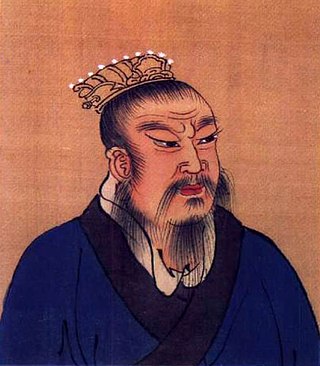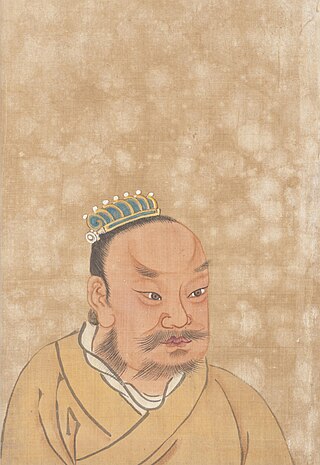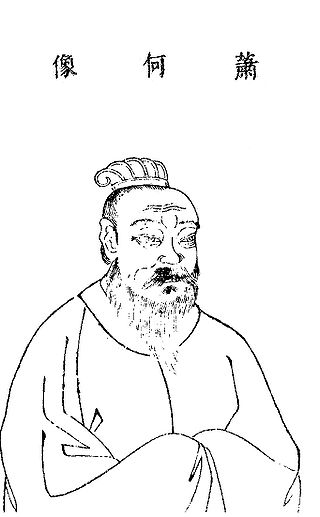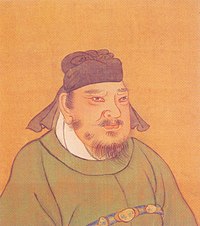
Lü Zhi, courtesy name E'xu (娥姁) and commonly known as Empress Lü and formally Empress Gao of Han, was the empress consort of Gaozu, the founding emperor of the Han dynasty. They had two known children, Liu Ying and Princess Yuan of Lu. Lü was the first woman to assume the title Empress of China and paramount power. After Gaozu's death, she was honoured as empress dowager and regent during the short reigns of Emperor Hui and his successors Emperor Qianshao of Han and Liu Hong.

Emperor Gaozu of Han, also known by his given name Liu Bang (劉邦), was the founder and first emperor of the Han dynasty, reigning from 202 to 195 BC. He is considered by traditional Chinese historiography to be one the greatest emperors in history, credited with establishing the Pax Sinica, one of China's longest golden ages.

Zhang Liang, courtesy name Zifang, was a Chinese military strategist and politician who lived in the early Western Han dynasty. He is also known as one of the "Three Heroes of the early Han dynasty" (漢初三傑), along with Han Xin (韓信) and Xiao He. Zhang Liang contributed greatly to the establishment of the Han dynasty. After his death, he was honoured with the posthumous title "Marquis Wencheng" by Emperor Qianshao. Zhang Liang is depicted in the Wu Shuang Pu by Jin Guliang.

The Chu–Han Contention (楚漢相爭), also known as the Chu–Han War (楚漢戰爭), was an interregnum period in Imperial China between the fall of the Qin dynasty and the establishment of the Western Han dynasty. After the third and last Qin ruler, Ziying, unconditionally surrendered to rebel forces in 206 BCE, the former Qin Empire was divided by rebel leader Xiang Yu into the Eighteen Kingdoms, which were ruled by various rebel leaders and surrendered Qin generals. A civil war soon broke out, most prominently between two major contending powers – Xiang Yu's Western Chu and Liu Bang's Han. Some of the other kingdoms also waged war among themselves but these were largely insignificant compared to the main conflict between Chu and Han. The war ended in 202 BCE with a Han victory at the Battle of Gaixia, during which Xiang Yu committed suicide after making a last stand. Liu Bang subsequently proclaimed himself emperor and established the Western Han dynasty.

Xiang Ji, courtesy name Yu, was the Hegemon-King of Western Chu during the Chu–Han Contention period of China. A noble of the state of Chu, Xiang Yu rebelled against the Qin dynasty, destroying their last remnants and becoming a powerful warlord. He was granted the title of "Duke of Lu" (魯公) by King Huai II of the restoring Chu state in 208 BC. The following year, he led the Chu forces to victory at the Battle of Julu against the Qin armies led by Zhang Han. After the fall of Qin, Xiang Yu was enthroned as the "Hegemon-King of Western Chu" (西楚霸王) and ruled a vast area covering modern-day central and eastern China, with Pengcheng as his capital. He engaged Liu Bang, the founding emperor of the Han dynasty, in a long struggle for power, known as the Chu–Han Contention, which concluded with his eventual defeat at the Battle of Gaixia and his suicide. Xiang Yu is depicted in the Wu Shuang Pu by Jin Guliang.

Xiao He was a Chinese calligrapher and politician of the early Western Han dynasty. He served Liu Bang, the founder of the Han dynasty, during the insurrection against the Qin dynasty, and fought on Liu's side in the Chu–Han Contention against Liu's rival, Xiang Yu. After the founding of the Han dynasty, Xiao He became the chancellor and held office until his death. For his contributions, he is also known as one of the "Three Heroes of the early Han dynasty" (漢初三傑), along with Han Xin and Zhang Liang.
Emperor Yi of Chu, also known as King Huai II of Chu before receiving his de jure emperor title, personal name Xiong Xin, was the ruler of the revived Chu state in the late Qin dynasty. He was a grandson of King Huai of Chu. In 223 BC, during the Warring States period, the Chu state was conquered by the Qin state, which unified the various Chinese feudal states in a series of wars and established the Qin dynasty in 221 BC. In 209 BC, when rebellions broke out throughout China to overthrow the Qin dynasty, the Chu state was revived as an insurgent state against Qin imperial rule. Xiong Xin was discovered by Xiang Liang, a rebel leader who descended from a famous Chu general, Xiang Yan, and installed on the Chu throne as "King Huai II of Chu". However, Xiong Xin was a puppet ruler because power was concentrated in Xiang Liang's hands, and while he was able to assert his power after Xiang Liang was killed in battle, eventually Xiang Liang's nephew, Xiang Yu, would concentrate power in his own hands through a coup against King Huai II's general Song Yi during the Battle of Julu. In 206 BC, the Qin dynasty was overthrown by the rebels, after which Xiang Yu, who was the de facto leader of all the rebel forces, divided the former Qin Empire into the Eighteen Kingdoms. He promoted King Huai II to a more "honourable" title – Emperor Yi of Chu – and made him the nominal sovereign ruler over all the Eighteen Kingdoms. Xiang Yu then had Emperor Yi relocated to Chen County and secretly ordered Ying Bu to assassinate the emperor during the journey.

The Feast at Swan Goose Gate, also known as the Banquet at Hongmen, Hongmen Banquet, Hongmen Feast and other similar renditions, was a historical event that took place in 206 BC at Swan Goose Gate outside Xianyang, the capital of the Qin dynasty. Its location in present-day China is roughly at Hongmenbao Village, Xinfeng Town, Lintong District, Xi'an, Shaanxi. The main parties involved in the banquet were Liu Bang and Xiang Yu, two prominent leaders of insurgent forces who rebelled against the Qin dynasty from 209 BC to 206 BC.

The Three Qins refer to three of the Eighteen Kingdoms, the short-lived power-sharing arrangement formed in 206 BC after the collapse of the Qin dynasty. The three kingdoms were located in Guanzhong Plain, the heartland of the Qin Empire.
Lu Wan was a Chinese military general, monarch, and politician who served as the vassal king of the early Han dynasty. He served under Liu Bang, the founding emperor of the Han dynasty.
Xiahou Ying, posthumously known as Marquis Wen of Ruyin, was a Chinese politician who served as Minister Coachman (太僕) during the early Han dynasty. He served under Liu Bang, the founding emperor of the Han dynasty, and fought on Liu Bang's side during the Chu–Han Contention against Liu Bang's rival, Xiang Yu. He is also sometimes referred to as the Duke of Teng in historical records.

Cao Shen or Cao Can, courtesy name Jingbo, was a Chinese politician. He served as a chancellor of the Western Han dynasty. He participated in the Chu–Han Contention on Liu Bang 's side and contributed greatly to the founding of the Han dynasty.

The Story of Han Dynasty is a Chinese television series based on the events in the Chu–Han Contention, an interregnum between the fall of the Qin dynasty and the founding of the Han dynasty in Chinese history. The series was first broadcast on CCTV in China in 2003. Directed by Wei Handao, the series starred Hu Jun, Xiao Rongsheng, Jacklyn Wu, Kristy Yang, Wang Gang and Li Li-chun.
Xiang Zhuang was a younger cousin of Xiang Yu, the "Hegemon-King of Western Chu". He fought on Chu's side as a military general during the Chu–Han Contention, a power struggle for supremacy over China between Xiang Yu and Liu Bang, the founder of the Han dynasty. Little is known about Xiang Zhuang, except for his role at the Feast at Hong Gate in 206 BC.
Xiang Chan, courtesy name Bo, better known as Xiang Bo, was a noble of the Chu state of the Seven Warring States. He was an uncle of the warlord Xiang Yu, who competed with Liu Bang, the founder of the Han dynasty, for supremacy over China in the Chu–Han Contention.
Li Yiji was a Chinese philosopher and politician. He served as a political adviser to Liu Bang, the founding emperor of the Han dynasty. His brother Li Shang, served as a military general under the Han dynasty.
The Battle of Pengcheng was fought in Pengcheng in April 205 BC between the kingdoms of Western Chu and Han, led by Xiang Yu and Liu Bang respectively. The Han forces were unprepared and suffered heavy losses. Several of Liu Bang's family members were captured and some of his allies defected to Chu as a result of his defeat.

King's War, also known as Legend of Chu and Han, is a Chinese television series based on the events in the Chu–Han Contention, an interregnum between the fall of the Qin dynasty and the founding of the Han dynasty. It started airing on Anhui TV, Zhejiang TV, Jiangxi TV and Tianjin TV on 28 December 2012.

The Last Supper is a 2012 Chinese historical film directed by Lu Chuan. The plot is based on events in the Chu–Han Contention, an interregnum between the fall of the Qin dynasty and the founding of the Han dynasty in Chinese history. The film was originally scheduled to be released on 5 July 2012, but was delayed. It premiered at the Toronto International Film Festival on 8 September 2012.
Guan Ying, posthumously known as Marquis Yi of Yingyin, was a Chinese military general and politician who served as a chancellor of the Western Han dynasty.












